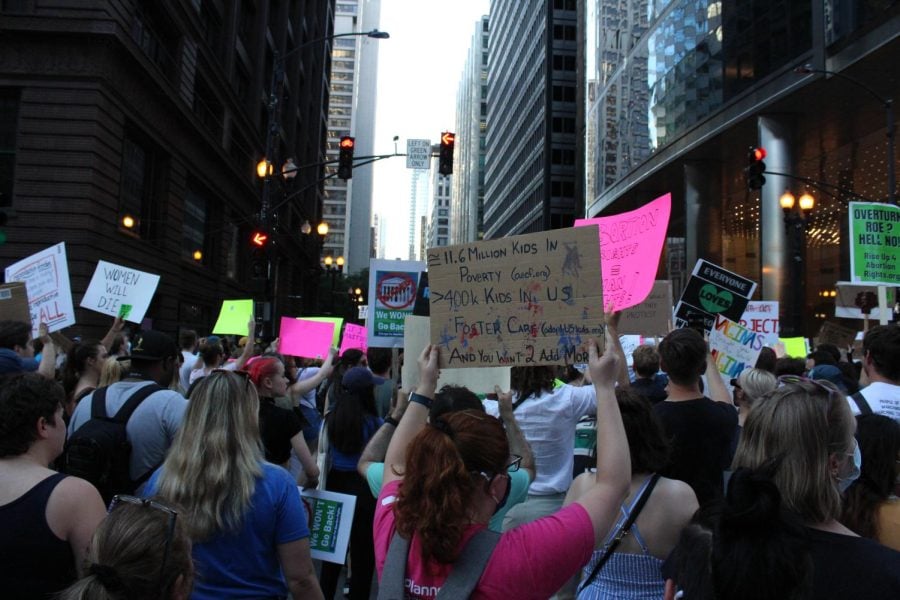Thousands march in downtown Chicago to protest overturning of Roe v. Wade
June 26, 2022
The first thing DePaul University sophomore Isabel Olivo saw when she woke up Friday was the news that Roe v. Wade had been overturned.
But she said she didn’t feel sad — she was livid. She immediately started preparing to protest the decision at the “We Won’t Go Back” rally held in downtown Chicago that evening.
“I saw other people crying in the middle of the street, strangers trying to wipe their tears away as quickly as they were falling,” Olivo said. “That’s when I started feeling like I could cry again.”
The march was hosted by Chicago for Abortion Rights and co-sponsored by more than 40 local organizations, including the Chicago Abortion Fund, Illinois National Organization for Women and American Civil Liberties Union of Illinois. Thousands gathered in Federal Plaza where speakers kicked off the event at 5:30 p.m. Protesters returned Saturday and members of Chicago for Abortion Rights also marched in Sunday’s Pride parade.
Olivo said she attended the 2017 Women’s March after former President Donald Trump’s inauguration and plans to continue protesting in the aftermath of Friday’s decision.
“We won (abortion rights) in the streets the first time. If we’re ever going to get it back, it’ll be in the streets a second, third, fourth and fifth time,” Olivo said. “I recognize that this country is never going to give a f–k about me unless I’m in the middle of the street screaming that they should.”
Illinois Gov. J.B. Pritzker encouraged protesters to vote, specifically talking about Tuesday’s primary elections. He said all of the Republican candidates for governor have anti-abortion platforms and emphasized the importance of electing officials who support abortion rights.
Pritzker signed the Reproductive Health Act in 2019. The legislation guarantees individuals a fundamental right to make decisions about their own reproductive health and includes the right to an abortion.
“What these right-wingers are calling a celebration of life today will actually lead to death — the death of women in abusive situations, the death of women whose health is at risk and the death of women and girls who will still seek abortions, but those abortions will now be unsafe,” Pritzker said.
In 1972, the last full year before the Roe v. Wade decision, there were 35 deaths resulting from illegal abortions. The total fell to 19 in 1973 and to single digits or zero every year afterward, according to Pew Research Center.
Attendee Hannah Walker said she was inspired to see how many people showed up for the march. She said it’s important to stick together against this “attack” on reproductive rights.
“I’ve known a lot of people who have had a better quality of life because of the ability to have access to health care or abortions,” Walker said. “It’s really upsetting to think of what’s going to happen now going forward to individuals out there who don’t have those options readily available.”
Alicia Hurtado, a speaker from the Chicago Abortion Fund, encouraged protesters not to feel helpless.
CAF financially supports individuals seeking an abortion in Illinois, whether they are residents or from out of state. In the first three months of 2022, more than 80% of their grantees were from out of state.
“We want our communities to be a resource instead of being policed and criminalized,” Hurtado said. “Abortion funds are here to support you. Abortion is common and you are loved.”
Throughout the march, protesters shouted chants like, “Pro-life is a lie, they don’t care if people die”; “Hey hey, ho ho, these justices have got to go” and “How do we get out of this mess, revolution nothing less.”
Attendee Jade, who preferred not to share her last name, carried a sign that read, “We didn’t survive a plague just to go back to the Dark Ages.”
“Once you take one step back, it’s like a backslide into so many other things,” Jade said. “I’m legitimately afraid of what else could possibly happen after today.”
Abortion provider Mary Bowman said protesters need to band together to build a movement to move forward. While abortion remains legal in Ilinois, Bowman and other speakers said organizers need to support individuals in other states who now do not have the same level of access.
Some states surrounding Illinois, including Wisconsin, Kentucky and Missouri, have effectively banned all abortions. Kentucky and Missouri, along with 11 other states, had trigger bans — laws written to take effect either immediately, by state official certification or after a 30-day waiting period — in place before Roe was overturned.
“In this country, where it’s easier to commit mass murder than it is to save your own life, I am struggling to understand how we are going to win reproductive freedom and justice,” Bowman said. “I take solace in the fact that it is not me alone who has to figure that out.”
Email: [email protected]
Twitter: @isabeldfunk
Email: [email protected]
Twitter: @selenakuznikov
Related Stories:
— What Illinois reproductive rights would look like in a world without Roe v. Wade
— Thousands gather in Chicago to march for reproductive justice following Roe v. Wade opinion leak


